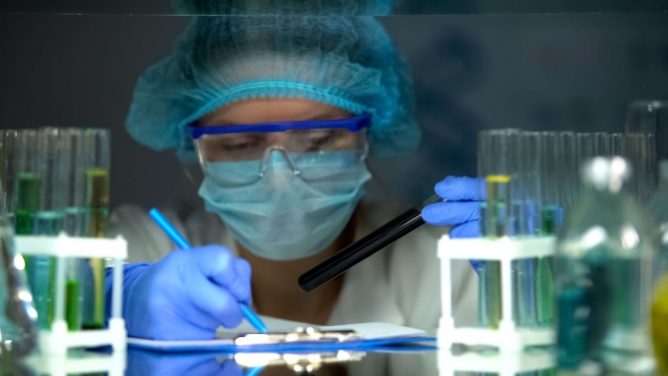Mesothelioma Clinical Trials Resume After COVID-19 Disruption
Research & Clinical TrialsWritten by Sean Marchese, MS, RN | Edited By Walter Pacheco

When the COVID-19 pandemic struck earlier this year, clinical trials at medical centers around the world slowed enrollment or placed trial activities on hold.
As businesses begin to reopen in the United States, more treatment centers are resuming mesothelioma study activities and ramping up enrollment.
Clinical research trials offer patients access to experimental mesothelioma treatments that haven’t yet been approved by the U.S. Food and Drug Administration. These treatments may provide higher chances of survival than the current standard of care.
“So far, every patient I have seen during the COVID-19 pandemic has favored alternative therapies to surgery,” Dr. Nestor Villamizar, a thoracic surgeon at Sylvester Comprehensive Care Center in Miami, told The Mesothelioma Center at Asbestos.com. “These are showing promising results, like dual immunotherapy and chemotherapy with Tumor Treating Fields.”
A number of treatment centers, such as Brigham and Women’s Hospital in Boston, delayed mesothelioma clinical trials at the start of the pandemic. Others, such as the Pacific Mesothelioma Center in Los Angeles, continued screening patients, but on a limited basis.
Now, many mesothelioma clinical trials are resuming regular screening and enrollment measures for mesothelioma patients at most sites.
Hundreds of Cancer Clinical Trials Now Back on Course
Thanks to measures put in place by the National Cancer Institute, medical professionals have been able to make safe and effective adjustments to clinical trial visits and study activities.
The NCI has worked with institutional review boards and trial sponsors to provide more flexibility for the timing of patient tests and assessments.
Adjustments like these have allowed some mesothelioma treatment centers to keep clinical trials open without disruption.
“At New York Proton Center, we have been fortunate to continue research operations without any interruptions throughout the pandemic,” Dr. Charles B. Simone, chief medical officer at NYPC, told The Mesothelioma Center at Asbestos.com. “We have continued to offer existing clinical trials to patients and even opened new trials over the past several months.”
Most disruptions in the clinical research community occurred between March and May. Information from data analytics and consulting company GlobalData found that over 400 clinical trials have since resumed regular activity.
“Trials with delayed initiation have risen by 10%, and trials that have been impacted by slow enrollment have gone up by 13.9%,” said Brooke Wilson, associate director of trials intelligence at GlobalData.
This suggests that trials that had already initiated enrollment before the pandemic, but then suspended due to COVID-19, are having more success picking up where they left off as long as enrollment wasn’t impacted, she said.
“The total number of disrupted trials is falling, and the number of clinical trials that have resumed has almost doubled since last month,” Wilson said. “This implies that sponsors and contract service providers have begun to adjust clinical trial design strategies and are adapting to the new post-COVID-19 environment.”

Try our new clinical trials search tool to find active trials near you. Get help enrolling today.
Find a Clinical TrialCancer Clinical Trials Take New Shape After COVID-19
The pandemic has forced researchers to evaluate the logistics of clinical trial methods and improve upon outdated aspects. Many treatment centers have adjusted policies and procedures to enhance the safety of trial participants during the pandemic.
For example, a number of trial sites have increased the accessibility of travel for patients, and others have been able to ship trial medications directly to patients’ homes.
Many study visits are taking place virtually, and independent clinics are now authorized to perform blood tests in less-crowded settings.
The FDA altered many of its research trial guidelines and published a comprehensive guide on conducting clinical trials during COVID-19 with an emphasis on patient safety and the continuation of research. This new guidance provides flexibility that previously wasn’t available.
According to a survey by WCG Clinical, a company that aggregates data on 93% of industry sponsored clinical trials, over 73% of research sites will continue to use telemedicine after the COVID-19 pandemic. In the same survey, 72% of sites indicated they “rarely” or “never” used virtual visits for clinical trial participants before COVID-19.
Thanks to technological advancements in telemedicine and higher adoption of virtual visits, there is an opportunity for clinical trials to become less restricted by geographic location.
Cancer patients who have difficulty traveling may no longer need to worry about being disqualified for a potentially life-saving experimental treatment.
Other recent advancements include electronic signatures for consent forms and the ability to remotely monitor vital signs such as blood pressure and heart rate. These improvements not only keep patients safe, but pave the way for more patients to enroll in mesothelioma clinical trials.
Currently, over 100 active clinical trials across North America are enrolling mesothelioma patients. That number will continue to grow as more treatment centers adjust to phased reopenings and implement new methods of treating participants safely.
However, mesothelioma patients who do not currently have the option of a clinical trial due to COVID-19 mustn’t delay their cancer care.
“While mesothelioma continues to be a rare and difficult-to-treat cancer, I always encourage patients to consider clinical trials,” said Simone. “But timely treatment is often important, and patients should not put their cancer care on hold, whenever possible, due to COVID-19 or due to centers pausing clinical trial accruals due to the pandemic.”






